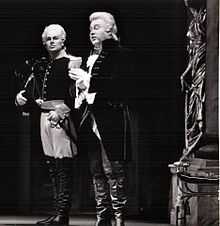Rush Tully
Rush Tully (born in Iola, Wisconsin, July 30, 1949) is an American composer and operatic bass-baritone who performed many seasons with Lyric Opera of Chicago in the company of such luminaries as Plácido Domingo, Mirella Freni, Alfredo Kraus, Paul Plishka and Nicolai Ghiaurov. He also worked under the stage directors Jean Pierre Ponelle, Franco Zeffirelli, Hal Prince, and Metropolitan Opera conductor James Levine.

He sang his first public performance at age 6, and by 15 he was working professionally teaching guitar and doing folk concerts. At 18 began composing his first songs. At 20 he became a winner of the Santa Fe Opera auditions (the youngest male ever). There he began his road in the operatic world under director Lotfi Mansouri, who quickly noticed not only his rich, dark voice but considerable acting skills as well.
Before launching full time into the life of an opera singer he pursued further studies at the University of Southern California under William Eddy, University of New Mexico under Tom Philips, and the Vienna Music Academy under the famous soprano Hilde Zadek. Later, he would study with the tenor Gualtiero Negrini (an artistic friendship that has lasted nearly three decades). In this period he gave critically acclaimed performances of the Felix Mendelssohn Elijah. This would soon be followed by Tully winning the Lyric Opera of Chicago auditions.
There he would be heard on 8 national radio broadcasts and in countless roles. In the following years he would make notable appearances such as his Papageno in Mozart's Die Zauberflöte with the Chicago Symphony, as well as performing with the Ravinia and Grant Park Festivals, Milwaukee Florentine Grand Opera, Tulsa Grand Opera, Minnesota Opera, Cleveland Opera, Opera Orchestra of Los Angeles as Verdi's Attila, Opera à la Carte of Los Angeles and many others.
He has served virtually his entire professional life as a church musician, in the capacity of music director, choir conductor, section leader, and soloist. Certainly grounding him spiritually while being in the whirlwind life of the theater, it was in the spiritual venue that his componistic abilities began to truly flourish. Now his works are performed across the United States in both sacred and secular settings.
He is currently working on a 5 CD recording project of sacred music (a personal investigation into human spirituality and the presence of God within human circumstance), and has composed many song cycles for piano and voice, two settings of the Magnificat – Nunc Dimittis, three settings of O Magnum Mysterium, and a Requiem for Children, scored for violin, cello, and harp. His newest song cycle, Any Given Day, for voice, clarinet and harp, is receiving its debut on the soon to be released CD by San Francisco baritone William Tull (no relation).
He recently completed the musical score for Jose Garcia-Davis's epic masterpiece, The Magdalena Cantata, which receives its world premiere on January 25, 2007 at the National Hispanic Cultural Center for the Arts in Albuquerque, New Mexico.